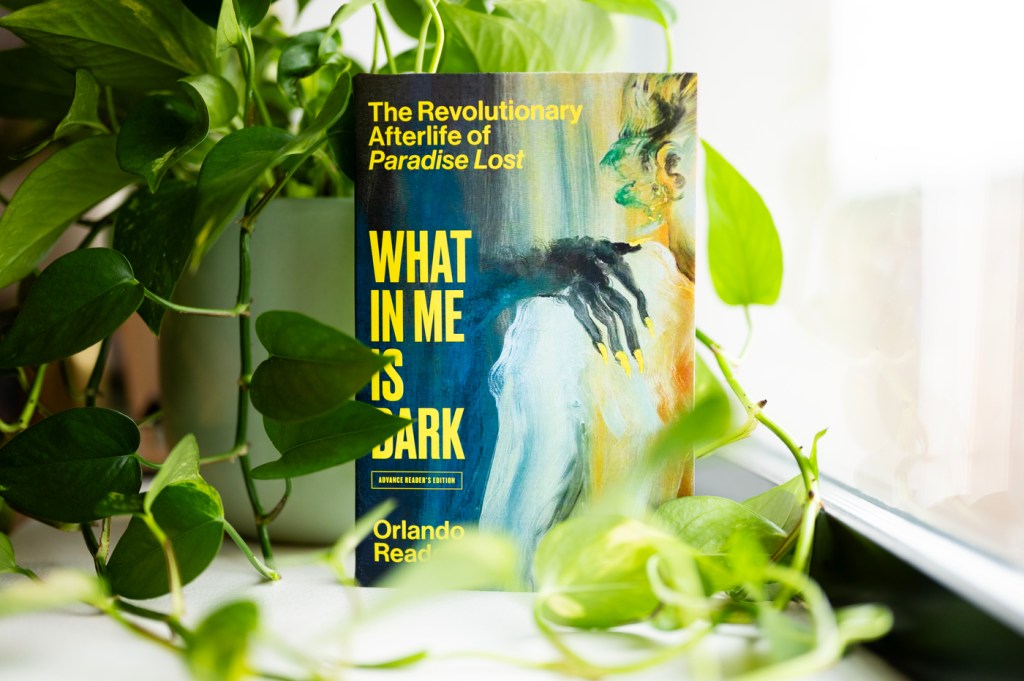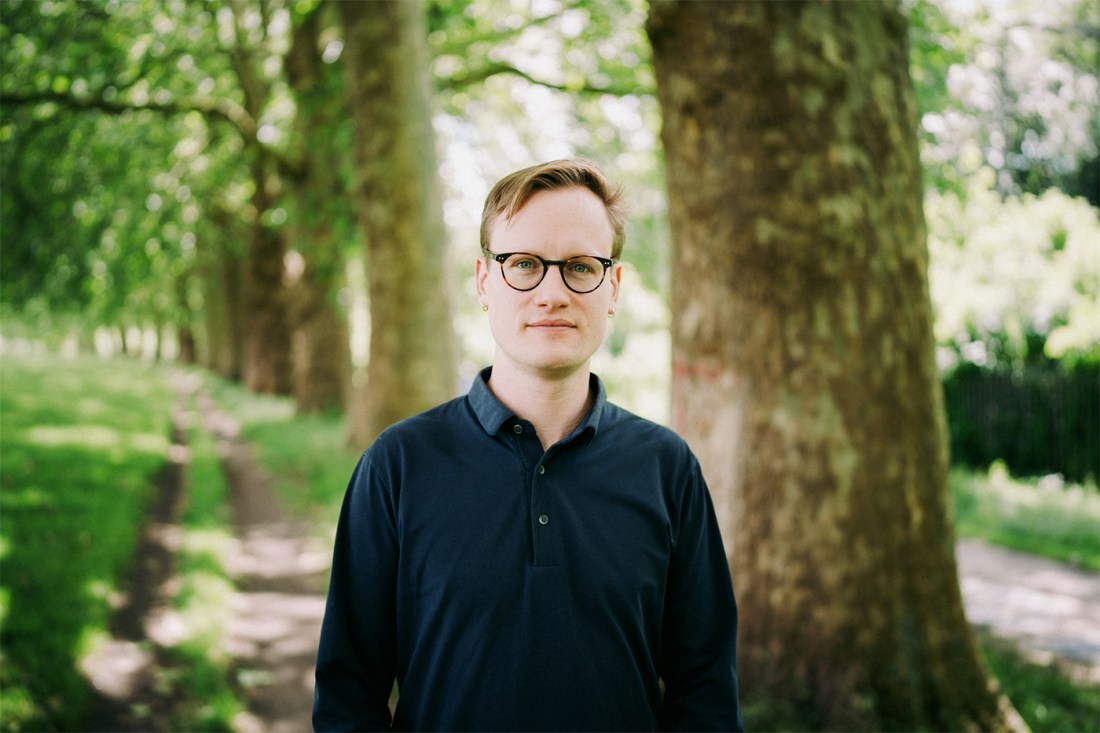How an inmate’s insight inspired Northeastern professor’s modern take on ‘Paradise Lost’
Assistant professor Orlando Reade’s “What In Me Is Dark” has won plaudits for the way it has shone a light on John Milton’s epic and its attractiveness to history’s freedom fighters.

LONDON — It was a remark made by a prison inmate that first planted the seed of Orlando Reade’s highly acclaimed debut book.
When in his fifth year of teaching incarcerated students in the U.S., one member of the class noted that the first line of John Milton’s epic “Paradise Lost” could “be read in a way that was disobedient,” the assistant professor of English at Northeastern University recalls.
Reade admits that he was “afraid” of the libertarian’s 17th-century poem, which details the biblical story of the fall of man and Satan’s ruinous revolt against God, because of its density and legacy. But his interaction with the inmate made him view the masterpiece “in a new way.”
“It was this that opened my mind to a poem that I had previously always thought to be dry a bit; more of a duty than a pleasure,” the author says.

It was this encounter that eventually led to “What In Me Is Dark: The Revolutionary Life of Paradise Lost,” a book in which Reade delves into the freedom fighters, reformers and modern thinkers who took inspiration from the 10,000 lines of blank verse. These historic figures saw “Paradise Lost” — which Reade says embodies a “poetic darkness” — as fueling disobedience.
Reade’s research found that Malcolm X had associated with the poem during his own time behind bars, while Thomas Jefferson regularly cited Milton in correspondence. According to “What In Me Is Dark,” “Paradise Lost” also had an influence on the likes of leading female novelists George Eliot and Virginia Woolf.
The way “Paradise Lost” regularly cropped up in the writings and speeches of history’s visionaries convinced Reade to write a book that could bring the story of pandemonium to a new and modern audience.
“I started to realize that there had been no book about ‘Paradise Lost’ for the general reader for decades,” he says. “I thought that one way of showing people that they should take interest in this apparently dry, intimidating text was to say, ‘Well, do you know how many people were inspired by it? If we haven’t read ‘Paradise Lost,’ how can we really understand Virginia Woolf, or George Eliot, or Malcolm X?’
“And from there I started, magpie-like, collecting these references to ‘Paradise Lost’ and this allowed me to build this very complex, expanding atlas of references to it across the modern age.”
His original take on Milton’s work has won plaudits from popular critics — The New York Times called it “enlightening and enthusiastic,” while U.K. newspapers The Financial Times and The Independent named it as one of their top books of 2024 — suggesting that Reade’s belief that modern readers are ready for a re-introduction to the 12-book text was correct.
For Reade, the revolutionary spirit of “Paradise Lost” and its enduring appeal stems from the context in which it was written, with Milton composing the poem (he dictated it due to having become blind) after being part of a failed uprising, following the end of the English Civil War and the restoration of the monarchy.
“Milton was writing in the 1660s after the failure of this attempt to establish a democratic republic in England, which he passionately championed,” says Reade.
“I see ‘Paradise Lost’ as a statement of Milton’s undying commitment to the principles of the democratic republic. It was obviously in some ways different from our concept of democracy today but, nevertheless, a statement that political liberty is something to be fought for and that the whims of a single individual leader are always going to be subject to forms of tyranny and abuse.”
The historical figures that Reade goes on to explore in his 246-page book may have all been fighting for different forms of liberty — whether it be the right to national self-rule, Black emancipation or equal gender rights — but he argues that they each took power from Milton’s biblical retelling.
Malcolm X would quote “Paradise Lost” in his speeches and Jefferson copied out some 30 quotations from the tome into his notebook — more than for any other English poet, Reade points out.
Editor’s Picks
Jefferson would have been reading “Paradise Lost” with the full knowledge of Milton’s own zeal for political change, he adds.
“When Thomas Jefferson read it, it was already the case that the American colonies were starting to view England and the British parliament as a kind of tyranny,” Reade says. “And so Jefferson would have identified with Milton as he as a young man started to become engaged by the cause of political liberty in his own context.
“He didn’t read it necessarily as political propaganda. But I think he would have seen it as an expression of liberty — a liberty of expression by someone who also championed political liberty.”
Centuries-long debate has surrounded “Paradise Lost” and Milton’s portrayal of Satan, with critics arguing that he is made to be a more attractive character than God. The Romantic poet William Blake famously said Milton “was of the devil’s party without knowing it.”
With Lucifer saying during one of his grandiose speeches that opens the Homeric tale about having “the courage never to submit or yield,” it does not require much imagination to see how leaders of uprisings could potentially warm to what Reade calls a seductive figure.
But Reade puts forward the opinion that those believing Satan to be the more compelling character fall into the very temptation laid on by Milton.
“My own personal reading of the poem is that Milton has constructed this brilliant mystery,” says the academic. “The poem opens — we have Satan cast down to hell; he’s a failed revolutionary.
“We think, ‘Wait a second — I know that Milton is a failed revolutionary. Should I be sympathizing with Satan?’ Milton tempts us to sympathize with Satan. But if we read the whole poem, gradually we find out that — no, Satan is not a freedom fighter. In fact, he’s a tyrant.
“And God is not a tyrant. In fact, he is the source of love, freedom and justice. But you have to read the whole poem in order to find out why. In doing so, Milton gives us a political education — to be involved in politics, we have to be literate at reading and interpreting acts, and working out: Is this on the side of freedom or is this a form of oppression?
“And so ‘Paradise Lost’ is teaching us to become literate in freedom and in understanding it.”











